★★★★½
“The harder they come…”

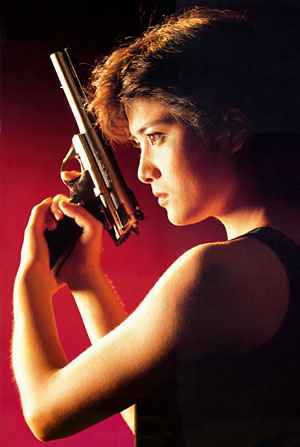 Firstly, in case you’re wondering, there was no In the Line of Duty 2, or even In the Line of Duty. Well, not as such… In the Line of Duty is the European title for Royal Warriors, and In the Line of Duty 2 is Yes, Madam!. Even though the latter was made first, they were released in a different order in some territories, with the success of In the Line of Duty/Royal Warriors leading to a swift re-titling for marketing purposes of Yes, Madam!. However, one presumes makers D+B Films decided to save time, simply adopting the name for the third “installment” in the – really, non-existent – series. I hope you’re paying attention at the back. This will be on the test. ;-)
Firstly, in case you’re wondering, there was no In the Line of Duty 2, or even In the Line of Duty. Well, not as such… In the Line of Duty is the European title for Royal Warriors, and In the Line of Duty 2 is Yes, Madam!. Even though the latter was made first, they were released in a different order in some territories, with the success of In the Line of Duty/Royal Warriors leading to a swift re-titling for marketing purposes of Yes, Madam!. However, one presumes makers D+B Films decided to save time, simply adopting the name for the third “installment” in the – really, non-existent – series. I hope you’re paying attention at the back. This will be on the test. ;-)
There was, however, a problem. Namely, the star of the previous two films, Michelle Yeoh (at that time, better known as Michelle Khan) was unavailable – having married D+B owner, Dickson Poon. Their choice was “Cynthia Khan”, a name obtained by combining that of the two Yes, Madam! stars, Cynthia Rothrock and Michelle Khan. Like her predecessor, she was not from Hong Kong, coming from Taiwan, and was also both a martial-arts novice and a former dancer whose aspirations in that direction had been limited by injury. [You can also add Moon Lee into the “former dancer” category] Despite this lack of long-term background, she slots right in, and the result is a solid action heroine flick.
The plot is largely based around revenge; the catalyst is a Japanese cop (Fujioka), whose partner is shot by a terrorist (Ong) during a jewel robbery. He reckons the jewel owner, Yamamoto, was doing an insurance scam, and follows him to Hong Kong, since there is too much influence to press charges in Japan. The terrorist and his partner (Nishiwaki) have also come to Hong Kong, seeking to buy arms with their loot, but discover the jewels are fake, and they too have been scammed, so want to take it out on Yamamoto. Meanwhile, Madam Yeung (Khan) has joined the police squad run by her uncle; he doesn’t want her to do anything risky, despite her being the most talented officer on the roster, so assigns her to babysit the Japanese cop, show him the sights and keep him out of mischief.
No prizes for guessing exactly how well that works – or for predicting that it will all lead to a brutal brawl in a warehouse between Nishiwaki, Khan and Dick Wei, as the various agendas of revenge come into conjunction. It’s rough-housing at its best, with everything save the kitchen sink (but including an industrial drill) being used as weapons. While the doubling for Khan is occasionally apparent, there are also moments you think she’s being doubled, until she swings round to show her face. Overall, for what was basically her debut, it’s pretty impressive, and credit to action directors Chris Lee, Tony Leung Siu-Hung, Brandy Yuen and Yuen Cheung-yan, as well as, of course, to Khan herself.
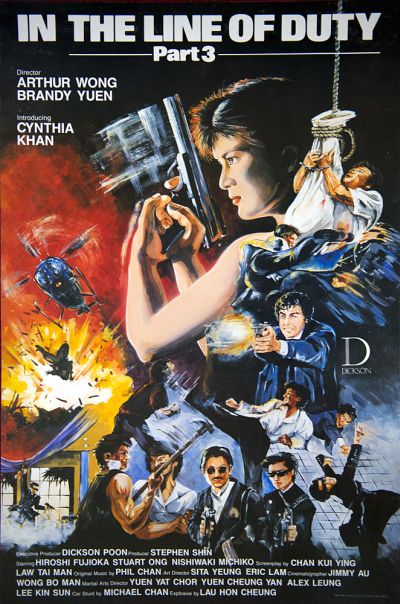 The script is not bad. It does suffer from the usual unevenness of tone, with occasional comedic interludes that detract from an impressively dark tone, especially as the film progresses. The worst offender there is a meaningless cameo by Eric Tsang and Richard Ng (well-known HK actress Sandra Ng also shows up in an early supporting role), but there are nice moments which help give all the characters depth, and the storyline makes basic sense, which is more than can be said for some entries in the genre. Though let’s just hope, it isn’t as easy to get a bomb – complete with ticking digital counter – into the heart of a Hong Kong police station these days!
The script is not bad. It does suffer from the usual unevenness of tone, with occasional comedic interludes that detract from an impressively dark tone, especially as the film progresses. The worst offender there is a meaningless cameo by Eric Tsang and Richard Ng (well-known HK actress Sandra Ng also shows up in an early supporting role), but there are nice moments which help give all the characters depth, and the storyline makes basic sense, which is more than can be said for some entries in the genre. Though let’s just hope, it isn’t as easy to get a bomb – complete with ticking digital counter – into the heart of a Hong Kong police station these days!
What I particularly like about the film, is the nicely-built sense of escalation. The opening scene, in which Khan handles a traffic-offender, then a robber, is light fluff, like you’d expect from the Inspector Wears Skirts series. Almost immediately, however, the body count starts to rise, not least since the terrorists’ approach involves a startlingly reckless disregard for human life. While Khan’s acting talents are, perhaps wisely, hardly tested, Nishiwaki delivers a good performance of striking intensity, and it always struck me as a shame that she didn’t get many lead roles like this one: she’s more known for her cameos, as in God of Gamblers or My Lucky Stars.
This is undeniably a fun time-passer, and a good example of the HK girls-with-guns genre that flourished in the mid-80’s and has never quite been replicated since. There’s a moment towards the end where it’s suddenly made clear that anyone could die at any moment in this film: something you’ll rarely see in a Western flick (outside the horror genre, at least). It’s perhaps a shame they didn’t do this earlier, since from that moment on, this has a reckless, unpredictable attitude which ranks with the best action movies.
Dir: Brandy Yuen and Arthur Wong
Stars: Cynthia Khan, Hiroshi Fujioka, Michiko Nishiwaki, Stuart Ong
 Project A-ko is one of those odd films that probably could only be done as anime, though as live-action goes, something like Kung Fu Hustle comes close. It centers on three schoolgirls, A-ko, B-ko and C-ko: the first two are rivals for the third’s attention…but despite the lesbian subtext, it’s really not that kind of story. [Though the film was originally intended to be part of the Cream Lemon series, which definitely are those kind of stories] No, it’s far more concerned with A-ko’s superpowers, to which she’s largely oblivious, the gadgetry cooked up by B-ko, thanks to her apparently limitless finances, and C-ko’s ancestry, which turns out to be not of this Earth – and that explains a lot, it has to be said.
Project A-ko is one of those odd films that probably could only be done as anime, though as live-action goes, something like Kung Fu Hustle comes close. It centers on three schoolgirls, A-ko, B-ko and C-ko: the first two are rivals for the third’s attention…but despite the lesbian subtext, it’s really not that kind of story. [Though the film was originally intended to be part of the Cream Lemon series, which definitely are those kind of stories] No, it’s far more concerned with A-ko’s superpowers, to which she’s largely oblivious, the gadgetry cooked up by B-ko, thanks to her apparently limitless finances, and C-ko’s ancestry, which turns out to be not of this Earth – and that explains a lot, it has to be said.




 This Thanksgiving viewing – that may say more about our house than anything – was a suggestion by our teen daughter, which is somewhere between a incentive and a put-off. Normally, she won’t view anything with subtitles for more than two minutes; but her tastes are closer to Anchorman or The Notebook than French slasher pics. Reviews I read in advance were similarly split: either enthusiastic hype (“arguably the best horror movie since The Blair Witch Project” wrote
This Thanksgiving viewing – that may say more about our house than anything – was a suggestion by our teen daughter, which is somewhere between a incentive and a put-off. Normally, she won’t view anything with subtitles for more than two minutes; but her tastes are closer to Anchorman or The Notebook than French slasher pics. Reviews I read in advance were similarly split: either enthusiastic hype (“arguably the best horror movie since The Blair Witch Project” wrote 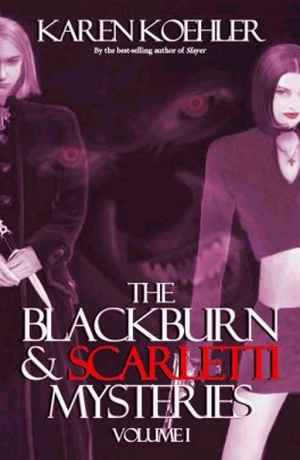 Take an FBI agent with some psychic ability, January Blackburn, and partner her with part-vampire Catholic priest, Dorian Scarletti. Intrigued? Me too. That’s the premise of the three stories in this book, where our odd couple investigate paranormal crimes around the US. The results are somewhat uneven, yet with much promise: Blackburn is probably a more interesting character, possessing both great inner strength, and quirks that make her vulnerable and more human. In contrast, Scarletti, thus far, seems a bit like a “vampire by numbers”, with all the standard moping around, relationship angst and so on, too familiar to be of more than passing interest. Though, must say, his weapon of choice – hundreds of cross-shaped throwing knives inside his coat – is worth cool points in my book (even if I presume he doesn’t go through airports).
Take an FBI agent with some psychic ability, January Blackburn, and partner her with part-vampire Catholic priest, Dorian Scarletti. Intrigued? Me too. That’s the premise of the three stories in this book, where our odd couple investigate paranormal crimes around the US. The results are somewhat uneven, yet with much promise: Blackburn is probably a more interesting character, possessing both great inner strength, and quirks that make her vulnerable and more human. In contrast, Scarletti, thus far, seems a bit like a “vampire by numbers”, with all the standard moping around, relationship angst and so on, too familiar to be of more than passing interest. Though, must say, his weapon of choice – hundreds of cross-shaped throwing knives inside his coat – is worth cool points in my book (even if I presume he doesn’t go through airports).
 Firstly, in case you’re wondering, there
Firstly, in case you’re wondering, there 
 This appears to be aiming for a leg-up on The Descent bandwagon and its theme of “chicks vs. cave-dwelling monsters in a remote wilderness”; though there’s only one of each here, rather than it being a team sport. “Troubled young ranger” Danielle St. Clair (Vincent) is atop a remote tower, watching out for fires, but a careless use of dynamite unleashes an ancient Indian evil that’s been trapped in a cave for centuries. Fortunately, despite said centuries, the monster still knows how to disable satellite dishes and trash Jeeps, as well as ripping the heads off everyone in the area it meets – except for St. Clair, of course, whom it merely terrorizes. The inevitable native American (Schweig) gets wheeled on for one scene of indigestible exposition, trotting out the usual cliches about how we’ve lost touch with our inner child, or some such New Age guff. Not that the beast cares much, I was pleased to see.
This appears to be aiming for a leg-up on The Descent bandwagon and its theme of “chicks vs. cave-dwelling monsters in a remote wilderness”; though there’s only one of each here, rather than it being a team sport. “Troubled young ranger” Danielle St. Clair (Vincent) is atop a remote tower, watching out for fires, but a careless use of dynamite unleashes an ancient Indian evil that’s been trapped in a cave for centuries. Fortunately, despite said centuries, the monster still knows how to disable satellite dishes and trash Jeeps, as well as ripping the heads off everyone in the area it meets – except for St. Clair, of course, whom it merely terrorizes. The inevitable native American (Schweig) gets wheeled on for one scene of indigestible exposition, trotting out the usual cliches about how we’ve lost touch with our inner child, or some such New Age guff. Not that the beast cares much, I was pleased to see. I think it may be more infuriating to see a film that
I think it may be more infuriating to see a film that  In the middle lies the action. While some fights work nicely, too often (particularly between Burgio and Kim) they are an obvious sequence of blocks, with blows having no impact – some parts of the car chases are clearly shot at an extremely sedate pace. The script is nothing special either; I hoped a woman, writer Caitlin McKenna, could bring fresh aspects, yet the story here is tired and old. CIA agent Skye Gold (Burgio) is compromised, targeted for death and forced on the run, leading to the usual “Who can she trust?” issues we’ve seen a million times before. There’s little new here of note; the film, indeed, largely abandons Gold for a lengthy chunk in the middle, deciding to focus on the assassins’ approach to the base where she’s hiding out.
In the middle lies the action. While some fights work nicely, too often (particularly between Burgio and Kim) they are an obvious sequence of blocks, with blows having no impact – some parts of the car chases are clearly shot at an extremely sedate pace. The script is nothing special either; I hoped a woman, writer Caitlin McKenna, could bring fresh aspects, yet the story here is tired and old. CIA agent Skye Gold (Burgio) is compromised, targeted for death and forced on the run, leading to the usual “Who can she trust?” issues we’ve seen a million times before. There’s little new here of note; the film, indeed, largely abandons Gold for a lengthy chunk in the middle, deciding to focus on the assassins’ approach to the base where she’s hiding out.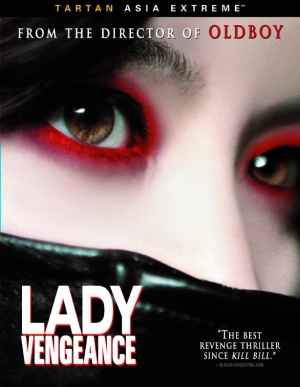 This film may need two viewings. First time up, I was irritated by an apparent lack of coherence – which was particularly annoying, since the non-linear storyline seemed almost completely superfluous. Second time round, it bothered me less though remained, perhaps deliberately, disorienting, and I still doubt the need for it. But the re-view left me better able to appreciate the great central idea, a chilling meditation on justice, revenge, the thin line between the two, and the effects on those who become involved. The final part of Park’s loose trilogy (after Sympathy for Mr. Vengeance and Oldboy) is the story of “kind-hearted Geum-ja” (Lee), who spends 13 years in prison, for the heinous murder of a young child. Except, she isn’t guilty, and spends the time forging alliances which will help with her new goal: revenge on the real perpetrator (Choi).
This film may need two viewings. First time up, I was irritated by an apparent lack of coherence – which was particularly annoying, since the non-linear storyline seemed almost completely superfluous. Second time round, it bothered me less though remained, perhaps deliberately, disorienting, and I still doubt the need for it. But the re-view left me better able to appreciate the great central idea, a chilling meditation on justice, revenge, the thin line between the two, and the effects on those who become involved. The final part of Park’s loose trilogy (after Sympathy for Mr. Vengeance and Oldboy) is the story of “kind-hearted Geum-ja” (Lee), who spends 13 years in prison, for the heinous murder of a young child. Except, she isn’t guilty, and spends the time forging alliances which will help with her new goal: revenge on the real perpetrator (Choi). The pace is stately, rather than adrenalin-driven, yet there’s no denying its place here. Much credit to Lee for a great performance in a complex character, capable of huge sacrifice in her quest for redemption: she cuts off a finger in front of the victim’s parents, and has to be physically restrained from removing more. Yet it seems that her charity and good deeds, such as donating a kidney to a fellow prisoner, may be part of her vengeance. And then, when her goal is within grasp…she steps back to allow others, perhaps better-motivated, to take her place. Or is the opportunity that she offers a poisoned chalice? The questions asked have no easy answers; neither proponents of capital punishment, nor those opposed to it, will find it comfortable viewing. By the end, there are no victims left; everyone is guilty – to use the old Sex Pistols line, no-one is innocent.
The pace is stately, rather than adrenalin-driven, yet there’s no denying its place here. Much credit to Lee for a great performance in a complex character, capable of huge sacrifice in her quest for redemption: she cuts off a finger in front of the victim’s parents, and has to be physically restrained from removing more. Yet it seems that her charity and good deeds, such as donating a kidney to a fellow prisoner, may be part of her vengeance. And then, when her goal is within grasp…she steps back to allow others, perhaps better-motivated, to take her place. Or is the opportunity that she offers a poisoned chalice? The questions asked have no easy answers; neither proponents of capital punishment, nor those opposed to it, will find it comfortable viewing. By the end, there are no victims left; everyone is guilty – to use the old Sex Pistols line, no-one is innocent.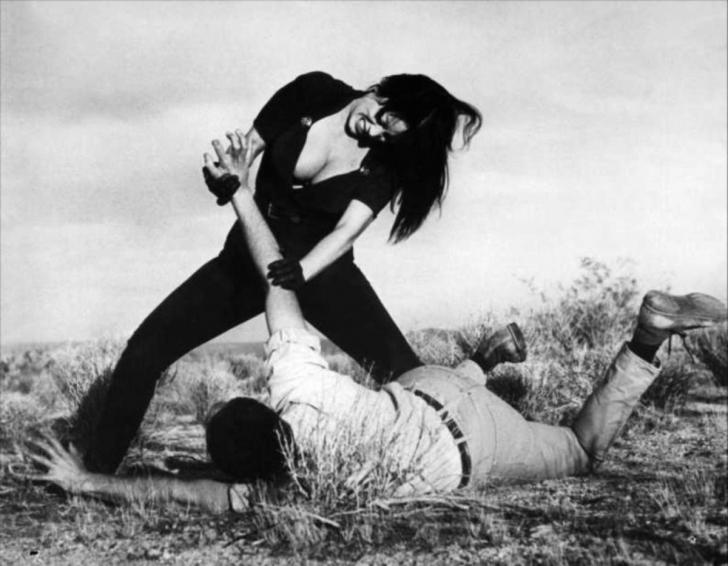
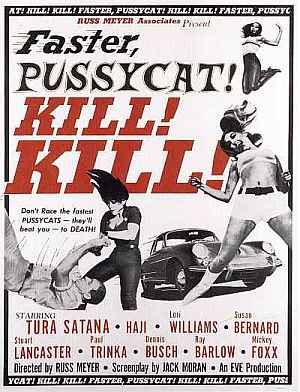
 Often neglected are the male contributors, in particular Stuart Lancaster as the target of their scheme. Though confined to a wheelchair, he rules his twisted clan with a rod of iron; in many ways, this is an ancestor of the family from Texas Chainsaw Massacre, with ‘the vegetable’ – as even his own father refers to him – a kinder, gentler version of Leatherface. Seeing the old man slobbering over Linda certainly shifts the audience, and helps to turn the murderous Varla and the other girls from villains into heroines, even as they progress their plan of robbery, because you sense their fate could end up being worse than death.
Often neglected are the male contributors, in particular Stuart Lancaster as the target of their scheme. Though confined to a wheelchair, he rules his twisted clan with a rod of iron; in many ways, this is an ancestor of the family from Texas Chainsaw Massacre, with ‘the vegetable’ – as even his own father refers to him – a kinder, gentler version of Leatherface. Seeing the old man slobbering over Linda certainly shifts the audience, and helps to turn the murderous Varla and the other girls from villains into heroines, even as they progress their plan of robbery, because you sense their fate could end up being worse than death.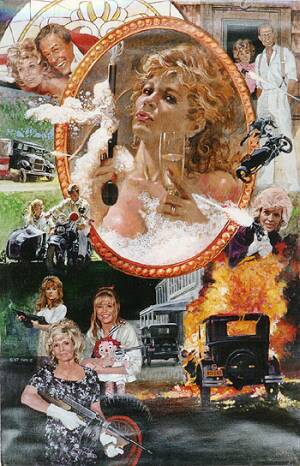 A Roger Corman production. Those four words cover much turf, both good and bad; this inclines toward the latter, simply because it takes an interesting premise, and goes next to nowhere with it. It’s less a sequel to, than a remake of the 1974 film, also starring Dickinson, which is generally believed to be superior. However, that isn’t on heavy cable rotation this month, so you’re stuck with the follow-up. Dickinson plays Wilma McClatchie, evicted from her home by uncaring businessman Morgan Crawford, and whose husband is killed in the process. She and her daughters Billie-Jean and Polly take up a life outside the law, but when Crawford makes a run for governor, their crimes take on a political perspective, as they aim to sabotage his campaign.
A Roger Corman production. Those four words cover much turf, both good and bad; this inclines toward the latter, simply because it takes an interesting premise, and goes next to nowhere with it. It’s less a sequel to, than a remake of the 1974 film, also starring Dickinson, which is generally believed to be superior. However, that isn’t on heavy cable rotation this month, so you’re stuck with the follow-up. Dickinson plays Wilma McClatchie, evicted from her home by uncaring businessman Morgan Crawford, and whose husband is killed in the process. She and her daughters Billie-Jean and Polly take up a life outside the law, but when Crawford makes a run for governor, their crimes take on a political perspective, as they aim to sabotage his campaign.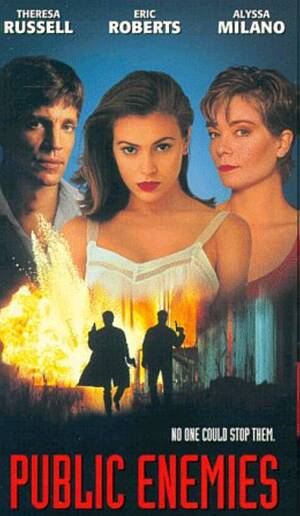 The story of Ma Barker, legendary leader of a bank-robbing gang consisting mainly of her sons, has inspired multiple movies, from relatively well-known (Roger Corman’s Bloody Mama) to obscurist (Ma Barker’s Killer Brood from 1960). They all play
The story of Ma Barker, legendary leader of a bank-robbing gang consisting mainly of her sons, has inspired multiple movies, from relatively well-known (Roger Corman’s Bloody Mama) to obscurist (Ma Barker’s Killer Brood from 1960). They all play